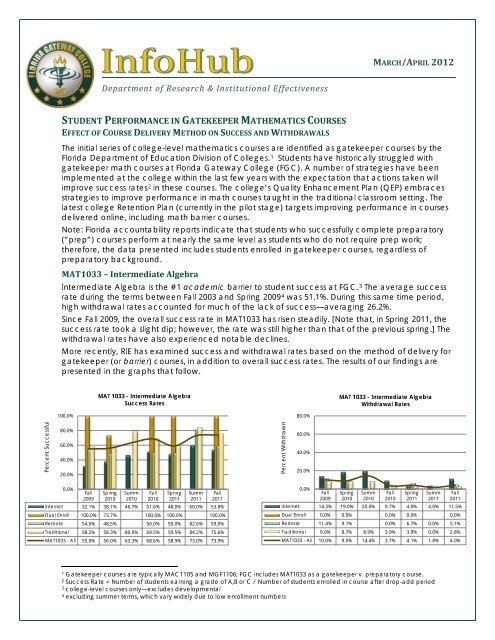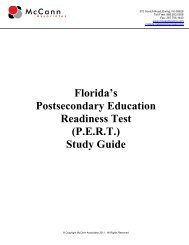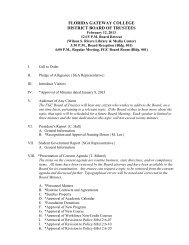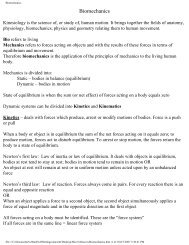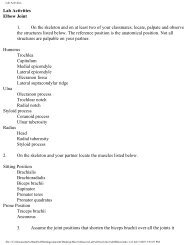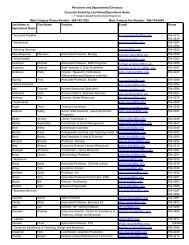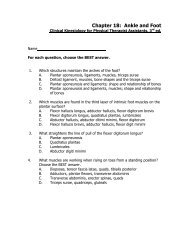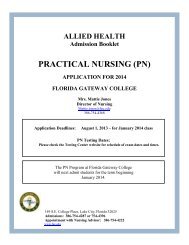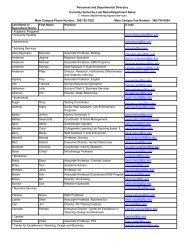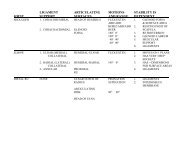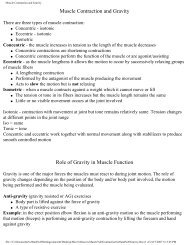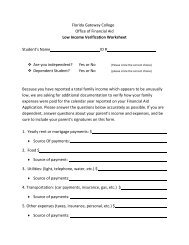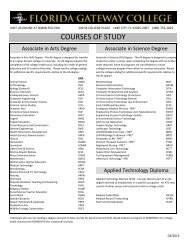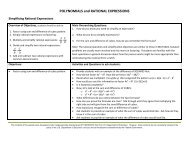Mar-Apr 2012 - Florida Gateway College
Mar-Apr 2012 - Florida Gateway College
Mar-Apr 2012 - Florida Gateway College
You also want an ePaper? Increase the reach of your titles
YUMPU automatically turns print PDFs into web optimized ePapers that Google loves.
Percent Successful<br />
Department of Research & Institutional Effectiveness<br />
STUDENT PERFORMANCE IN GATEKEEPER MATHEMATICS COURSES<br />
EFFECT OF COURSE DELIVERY METHOD ON SUCCESS AND WITHDRAWALS<br />
The initial series of college-level mathematics courses are identified as gatekeeper courses by the<br />
<strong>Florida</strong> Department of Education Division of <strong>College</strong>s. 1 Students have historically struggled with<br />
gatekeeper math courses at <strong>Florida</strong> <strong>Gateway</strong> <strong>College</strong> (FGC). A number of strategies have been<br />
implemented at the college within the last few years with the expectation that actions taken will<br />
improve success rates2 in these courses. The college’s Quality Enhancement Plan (QEP) embraces<br />
strategies to improve performance in math courses taught in the traditional classroom setting. The<br />
latest college Retention Plan (currently in the pilot stage) targets improving performance in courses<br />
delivered online, including math barrier courses.<br />
Note: <strong>Florida</strong> accountability reports indicate that students who successfully complete preparatory<br />
(“prep”) courses perform at nearly the same level as students who do not require prep work;<br />
therefore, the data presented includes students enrolled in gatekeeper courses, regardless of<br />
preparatory background.<br />
MAT1033 – Intermediate Algebra<br />
Intermediate Algebra is the #1 academic barrier to student success at FGC. 3 The average success<br />
rate during the terms between Fall 2003 and Spring 20094 was 51.1%. During this same time period,<br />
high withdrawal rates accounted for much of the lack of success—averaging 26.2%.<br />
Since Fall 2009, the overall success rate in MAT1033 has risen steadily. [Note that, in Spring 2011, the<br />
success rate took a slight dip; however, the rate was still higher than that of the previous spring.] The<br />
withdrawal rates have also experienced notable declines.<br />
More recently, RIE has examined success and withdrawal rates based on the method of delivery for<br />
gatekeeper (or barrier) courses, in addition to overall success rates. The results of our findings are<br />
presented in the graphs that follow.<br />
100.0%<br />
80.0%<br />
60.0%<br />
40.0%<br />
20.0%<br />
0.0%<br />
Fall<br />
2009<br />
MAT 1033 - Intermediate Algebra<br />
Success Rates<br />
Spring<br />
2010<br />
Summ<br />
2010<br />
Fall<br />
2010<br />
Spring<br />
2011<br />
Summ<br />
2011<br />
Fall<br />
2011<br />
Internet 32.1% 38.1% 46.7% 51.6% 48.0% 60.0% 53.8%<br />
Dual Enroll 100.0% 73.7% 100.0% 100.0% 100.0%<br />
Remote 54.5% 48.5% 50.0% 50.0% 82.6% 59.0%<br />
Traditional 58.2% 58.3% 80.0% 69.5% 59.5% 84.2% 75.6%<br />
MAT1033 - All 55.0% 56.0% 63.3% 68.6% 58.9% 73.0% 73.9%<br />
1 Gatekeeper courses are typically MAC1105 and MGF1106; FGC includes MAT1033 as a gatekeeper v. preparatory course.<br />
2 Success Rate = Number of students earning a grade of A,B or C / Number of students enrolled in course after drop-add period<br />
3 college-level courses only—excludes developmental<br />
4 excluding summer terms, which vary widely due to low enrollment numbers<br />
Percent Withdrawn<br />
80.0%<br />
60.0%<br />
40.0%<br />
20.0%<br />
0.0%<br />
Fall<br />
2009<br />
Spring<br />
2010<br />
Summ<br />
2010<br />
MARCH/APRIL <strong>2012</strong><br />
MAT 1033 - Intermediate Algebra<br />
Withdrawal Rates<br />
Fall<br />
2010<br />
Spring<br />
2011<br />
Summ<br />
2011<br />
Fall<br />
2011<br />
Internet 14.3% 19.0% 20.0% 9.7% 4.0% 4.0% 11.5%<br />
Dual Enroll 0.0% 0.0% 0.0% 0.0% 0.0%<br />
Remote 11.4% 9.1% 0.0% 6.7% 0.0% 5.1%<br />
Traditional 9.0% 8.7% 8.9% 3.9% 3.9% 0.0% 2.8%<br />
MAT1033 - All 10.0% 9.0% 14.4% 3.7% 4.1% 1.8% 4.0%
Percent Successful<br />
Notable observations from the above:<br />
On average, dual enrollment students taking classes at the high schools had higher success<br />
rates than those in any other category. Typically, this group comprises less than 10% of the total<br />
MAT1033 enrollment 5 ; however, with the continual growth in dual enrollment students at FGC,<br />
13.6% of MAT1033 enrollments in Fall 2011 were delivered at area high schools.<br />
Typically, since fall 2004, online sections of MAT1033 comprised an average of 10.8% of all<br />
MAT1033 enrollments. That percentage has shown growth in the last couple of years. In fall 2011,<br />
online courses represented nearly 15% of MAT1033 enrollments.<br />
Interestingly, the percentage of summer 2010 and summer 2011 online enrollments were 50%<br />
and 45%, respectively. Although success rates for traditional classes were still higher than those<br />
taught online, the success rates for the combined summer sections were substantially higher<br />
than for the preceding fall and spring terms.<br />
Overall, withdrawal rates are declining. This may be partially due to a change in college policy<br />
in Fall 2010 which no longer allowed faculty to withdraw students after the student-initiated<br />
withdrawal deadline. Online course withdrawal rates are typically higher than traditional<br />
classroom withdrawals, but there have been significant improvements in online retention in the<br />
past year.<br />
MAC 1105 – <strong>College</strong> Algebra<br />
As the cornerstone of higher level mathematics, <strong>College</strong> Algebra generally has the highest<br />
enrollment of any college-level math course. Success in this course is critical to those who plan to<br />
continue with their studies in mathematics, the sciences, business, engineering, and a myriad of<br />
other professions.<br />
As in the case of Intermediate Algebra, overall success rates in <strong>College</strong> Algebra have also risen<br />
steadily. The success rates for online sections of MAC1105 have improved somewhat, but are<br />
significantly lower than the success rates for traditionally delivered sections. With the exception of an<br />
anomaly noted in spring 2010, dual enrollment classes held at the high schools had the highest<br />
success rates.<br />
The graphs below depict success and withdrawal rates in MAC1105 by method of delivery.<br />
100.0%<br />
80.0%<br />
60.0%<br />
40.0%<br />
20.0%<br />
0.0%<br />
Fall<br />
2009<br />
MAC 1105 - <strong>College</strong> Algebra<br />
Success Rates<br />
Spring<br />
2010<br />
Summ<br />
2010<br />
Fall<br />
2010<br />
Spring<br />
2011<br />
Summ<br />
2011<br />
Other points of note:<br />
Overall, the average historical withdrawal rate for MAC1105 (Fall 2003 through Spring 2009,<br />
excluding summer terms) was 20.2%. Currently, the withdrawal rates are less than half of the<br />
historical averages.<br />
5 since Fall 2005; source: FGC Student Database (SDB)<br />
Fall<br />
2011<br />
Internet 35.7% 29.2% 37.9% 48.1% 38.5% 64.9% 40.8%<br />
Dual Enroll 83.9% 59.4% 95.5% 96.2% 93.2%<br />
Remote 0.0% 60.7% 57.1%<br />
Traditional 56.8% 65.7% 53.8% 68.9% 64.4% 72.9% 73.1%<br />
MAC1105 - All 57.1% 60.8% 48.1% 69.0% 66.9% 69.4% 72.8%<br />
Percent Withdrawn<br />
80.0%<br />
60.0%<br />
40.0%<br />
20.0%<br />
0.0%<br />
Fall<br />
2009<br />
MAC 1105 - <strong>College</strong> Algebra<br />
Withdrawal Rates<br />
Spring<br />
2010<br />
Summ<br />
2010<br />
Fall<br />
2010<br />
Spring<br />
2011<br />
Summ<br />
2011<br />
Fall<br />
2011<br />
Internet 32.1% 25.0% 34.5% 18.5% 3.8% 13.5% 36.7%<br />
Dual Enroll 6.5% 12.5% 4.5% 0.0% 2.7%<br />
Remote 66.7% 14.3% 2.9%<br />
Traditional 14.6% 7.2% 21.2% 4.9% 4.6% 12.5% 5.2%<br />
MAC1105 - All 16.0% 10.4% 25.9% 6.6% 3.5% 12.9% 9.3%
Percent Successful<br />
Online enrollments made up 14.6% of all MAC1105 enrollments in Fall 2011. The associated high<br />
withdrawal rate in that term (36.7%) negatively impacted the overall rate of improvement in<br />
online performance noted in the prior two years.<br />
MGF 1106 – Math for Liberal Arts I<br />
Math for Liberal Arts is an alternative to <strong>College</strong> Algebra for students who will not need higher level<br />
mathematics in their studies. Although considered a gatekeeper course statewide, the overall<br />
success rates—particularly in the traditional classroom setting—are amongst the highest of all<br />
mathematics courses offered at FGC. It is included in this study primarily because the course is an<br />
alternative to MAC1105 to meet general education and graduation requirements.<br />
Success rates in online sections of MGF1106 have varied widely—closely mirroring that of the<br />
traditional sections in the most recent terms; yet significantly lower in other terms. For the last couple<br />
of years, MGF1106 online sections have made up over 25% of the course’s enrollments.<br />
100.0%<br />
80.0%<br />
60.0%<br />
40.0%<br />
20.0%<br />
0.0%<br />
Summary<br />
Fall<br />
2009<br />
MGF 1106 - Math for Liberal Arts I<br />
Success Rates<br />
Spring<br />
2010<br />
Summ<br />
2010<br />
Fall<br />
2010<br />
Spring<br />
2011<br />
Summ<br />
2011<br />
Fall<br />
2011<br />
Internet 57.1% 61.5% 51.2% 41.4% 72.0% 57.4% 80.0%<br />
Traditional 74.1% 71.4% 85.7% 82.1% 73.8% 92.7%<br />
MGF1106 - All 69.6% 68.8% 56.3% 68.2% 73.3% 57.4% 88.8%<br />
The Department of Research and Institutional Effectiveness has studied overall success rates for<br />
traditionally taught and internet-delivered courses for the past several years. As a whole, the success<br />
rates for the various methods of delivery have been very close. However, the results noted above<br />
indicate that success rates in traditional classroom gatekeeper college-level math courses have<br />
been substantially higher than those taught online.<br />
When comparing like terms (fall-fall, spring-spring), there has been a notable improvement in<br />
student performance in the traditionally-taught gatekeeper math courses since the inception of the<br />
QEP. Although not all traditional sections incorporate QEP instruction techniques, the added<br />
professional development and creative instruction brought forth since its start in 2010 has had a<br />
positive impact on student success.<br />
The college’s Retention Plan focuses on better training and assessment measures for instructors of<br />
online courses. Improved online course quality and high levels of faculty-student engagement in<br />
online instruction is expected to lower course withdrawal rates by early identification of students<br />
who are least likely to succeed in an online course, thereby raising the success rates for gatekeeper<br />
courses to levels closer to that of the traditionally taught ones.<br />
“The illiterate of the 21st century will not be those who cannot read and write, but those who cannot learn, unlearn, and relearn.” ~ Alvin Toffler<br />
Contact Gail Burdick, Research Specialist, (386)754-7843 for further information.<br />
Percent Withdrawn<br />
80.0%<br />
60.0%<br />
40.0%<br />
20.0%<br />
0.0%<br />
Fall<br />
2009<br />
MGF 1106 - Math for Liberal Arts I<br />
Withdrawal Rates<br />
Spring<br />
2010<br />
Summ<br />
2010<br />
Fall<br />
2010<br />
Spring<br />
2011<br />
Summ<br />
2011<br />
Fall<br />
2011<br />
Internet 9.5% 3.8% 12.2% 17.2% 0.0% 8.5% 4.0%<br />
Traditional 1.7% 4.3% 14.3% 5.4% 0.0% 0.0%<br />
MGF1106 - All 3.8% 4.2% 12.5% 9.4% 0.0% 8.5% 1.3%


